高三一轮复习英语语法上
高三英语一轮复习语法第1讲名词的数格构词法考点讲义
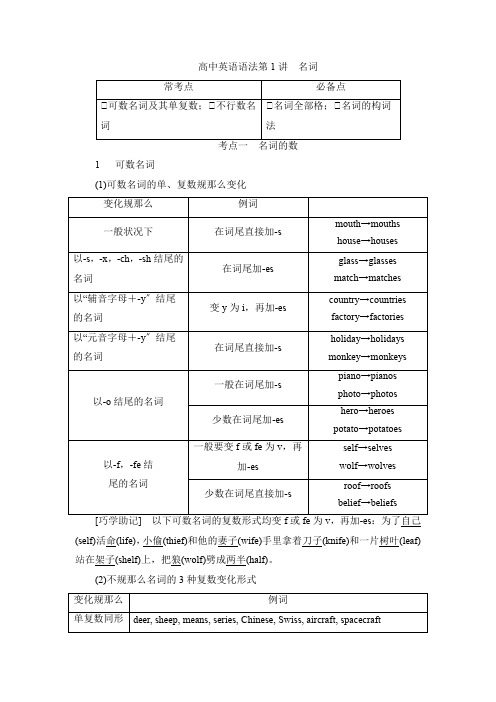
高中英语语法第1讲名词1 可数名词(1)可数名词的单、复数规那么变化:为了自己(self)活命(life),小偷(thief)和他的妻子(wife)手里拿着刀子(knife)和一片树叶(leaf)站在架子(shelf)上,把狼(wolf)劈成两半(half)。
(2)不规那么名词的3种复数变化形式一种鱼时,其单复数形式相同。
(2)people指“人们〞时单复数同形;指“民族〞时,其复数为peoples。
(3)合成名词的2种复数形式①假设有中心词,那么把中心词变成复数;假设无中心词,那么把最终一个词变成复数。
passerby→passersby, sisterinlaw→sistersinlaw, grownup→grownups①“man/woman+n.〞变复数时,作定语的man/woman和中心词都要变复数,如women engineers。
对点练1写出以下名词的复数形式①sheep—sheep①dish—dishes①knife—knives①story—stories①tomato—tomatoes2 不行数名词(1)常见的不行数名词一般来说,物质名词和抽象名词是不行数的,因此没有复数形式,一般也不能用a或an修饰。
通常只用作不行数的名词有:milk, music, homework, housework, weather, news, butter, information, bread, advice, progress, orange(橙汁), meat, equipment, fun, luggage, luck, work(工作), traffic, furniture, wealth, word(消息), room(空间), man(人类)等。
[名师点津]word意为“消息〞、room意为“空间〞、man意为“人类〞时,通常不带任何修饰词。
高三英语一轮语法复习课件:基本词法句法梳理

15. I shall have been working in the company for 4 years by the end of this year. 到今年底我在本公司已经工作四年。
16. I suppose that the play would have been running by then. 我想那部话剧到时会上演。
① I could smell he had been smoking. 我能闻出他抽烟。 ② My leg ached after long trip. 走长路后我的腿疼。 ③ I’m sorry; I hope I didn’t hurt you.? 对不起,我没有伤害你吧?
(9)
表心理动词
① It is understood that you will come. 相信你会来的。 ② I can imagine the scene clearly in my mind. 我可以清楚地想象出这一景象。
(12) 短语动词 ① I came across an interesting article in a magazine. 我在一本杂志上偶尔看到一篇有趣的文章。 ② We’ll look into the matter thoroughly. 我们要彻底调查这件事。
③ The prize is 500 dollars, which works out to about 4,000yuan. 奖品是500美元,折合人民币约 为4000元。 ④ My rent was paid for six months in advance. 我预付出了六个月的房租。
③ It has not yet been announced who will judge the case. 谁来判这个案子还没有宣布。
高三英语大一轮复习讲义 语法知识 专题八 状语从句 新人教版

专题八 状语从句、定语从句状语从句一、时间状语从句1.before 引导的从句中不用否定式谓语。
常用如下句型: It is long before...(过了好久才……) It is not long before...(过了不久就……)2.since 后面所用动词不同,该动词所表示动作持续时间的计算方法也不同。
⎩⎪⎨⎪⎧since +瞬间动词过去式从该动作发生时算起since +持续性动词过去式从动作结束时算起It is two years since he joined the army. It is two years since he smoked. 二、地点状语从句多由where 和wherever 引导。
Where there is a will ,there is a way. 二、原因状语从句在表示原因时,because 语气最重,其次是as ,since ,now that ,故在回答why 问句或者在强调句对原因进行强调时,只能用because 。
for 是并列连词,表示推测的理由或者进一步说明,不能放在句首,for 前要用逗号。
—Why were you absent? —Because I was ill. 三、目的状语从句1.so that/in order that 引导的目的状语从句中的谓语动词多用can/could/may/might/will/would +动词。
Please turn off the light so that I can go to sleep. 2.for fear that ,in case ,lest 表示“以防,免得”。
He is working hard for fear that he should fail. 四、条件状语从句1.providing/provided (that)假如,假若Providing (that) no one has further questions ,the meeting will be over. 2.on the understanding that =on condition that 在……条件下I give you money on the understanding that you finish your homework.五、结果状语从句注意such 引导的结果状语从句与定语从句的区别。
2025届高三英语一轮语法复习:+过去分词(短语)作定语+讲义
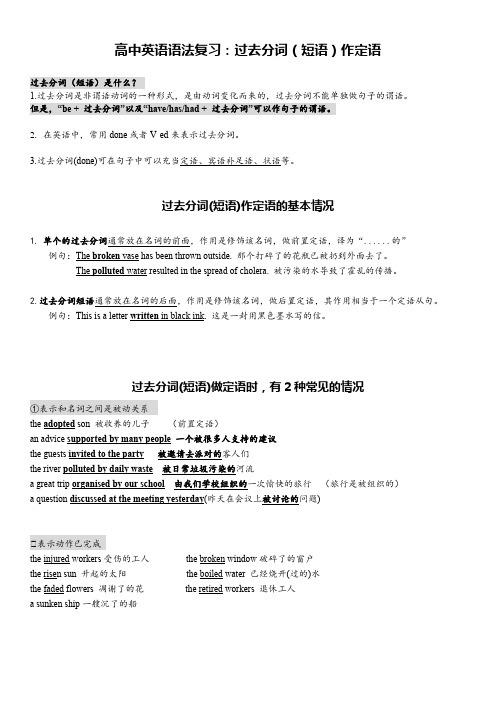
高中英语语法复习:过去分词(短语)作定语过去分词(短语)是什么?1.过去分词是非谓语动词的一种形式,是由动词变化而来的,过去分词不能单独做句子的谓语。
但是,“be + 过去分词”以及“have/has/had + 过去分词”可以作句子的谓语。
2.在英语中,常用done或者V-ed来表示过去分词。
3.过去分词(done)可在句子中可以充当定语、宾语补足语、状语等。
过去分词(短语)作定语的基本情况1.单个的过去分词通常放在名词的前面,作用是修饰该名词,做前置定语,译为“......的”例句:The broken vase has been thrown outside. 那个打碎了的花瓶已被扔到外面去了。
The polluted water resulted in the spread of cholera. 被污染的水导致了霍乱的传播。
2.过去分词短语通常放在名词的后面,作用是修饰该名词,做后置定语,其作用相当于一个定语从句。
例句:This is a letter written in black ink. 这是一封用黑色墨水写的信。
过去分词(短语)做定语时,有2种常见的情况①表示和名词之间是被动关系the adopted son 被收养的儿子(前置定语)an advice supported by many people 一个被很多人支持的建议the guests invited to the party被邀请去派对的客人们the river polluted by daily waste被日常垃圾污染的河流a great trip organised by our school由我们学校组织的一次愉快的旅行(旅行是被组织的)a question discussed at the meeting yesterday(昨天在会议上被讨论的问题)②表示动作已完成the injured workers受伤的工人the broken window破碎了的窗户the risen sun 升起的太阳the boiled water 已经烧开(过的)水the faded flowers 凋谢了的花the retired workers 退休工人a sunken ship一艘沉了的船【过去分词(短语)做定语时的特殊情况】①left,given,concerned,discussed, found, built, invited, mentioned, obtained, received, questioned, shown, told 等是单个的过去分词,但是,通常会放在名词后面作后置定语。
【高三学习指导】高三英语第一轮复习语法指导:struggle短语归纳
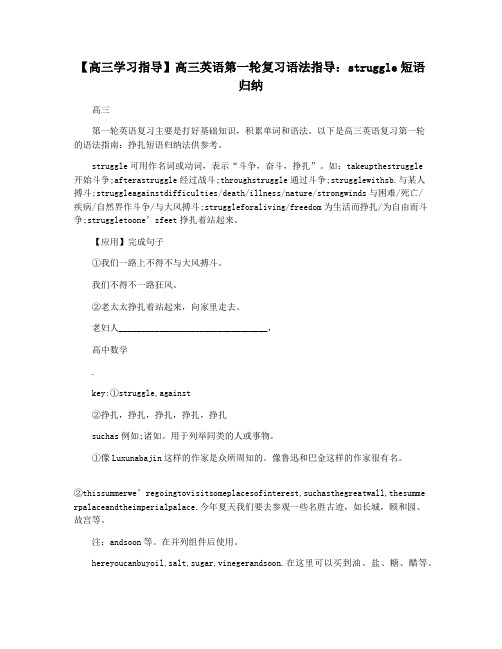
【高三学习指导】高三英语第一轮复习语法指导:struggle短语归纳高三第一轮英语复习主要是打好基础知识,积累单词和语法。
以下是高三英语复习第一轮的语法指南:挣扎短语归纳法供参考。
struggle可用作名词或动词,表示“斗争,奋斗,挣扎”。
如:takeupthestruggle开始斗争;afterastruggle经过战斗;throughstruggle通过斗争;strugglewithsb.与某人搏斗;struggleagainstdifficulties/death/illness/nature/strongwinds与困难/死亡/疾病/自然界作斗争/与大风搏斗;struggleforaliving/freedom为生活而挣扎/为自由而斗争;struggletoone’s feet挣扎着站起来。
【应用】完成句子①我们一路上不得不与大风搏斗。
我们不得不一路狂风。
②老太太挣扎着站起来,向家里走去。
老妇人_________________________________,高中数学.key:①struggle,against②挣扎,挣扎,挣扎,挣扎,挣扎suchas例如;诸如。
用于列举同类的人或事物。
①像Luxunabajin这样的作家是众所周知的。
像鲁迅和巴金这样的作家很有名。
②thissummerwe’regoingtovisitsomeplacesofinterest,suchasthegreatwall,thesumme rpalaceandtheimperialpalace.今年夏天我们要去参观一些名胜古迹,如长城,颐和园、故宫等。
注:andsoon等。
在并列组件后使用。
hereyoucanbuyoil,salt,sugar,vinegerandsoon.在这里可以买到油、盐、糖、醋等。
高三英语一轮复习语法专题---定语从句知识点梳理与题库
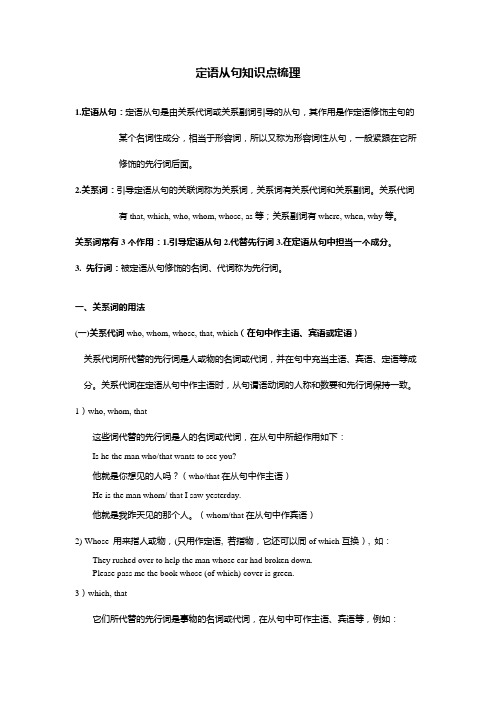
定语从句知识点梳理1.定语从句:定语从句是由关系代词或关系副词引导的从句,其作用是作定语修饰主句的某个名词性成分,相当于形容词,所以又称为形容词性从句,一般紧跟在它所修饰的先行词后面。
2.关系词:引导定语从句的关联词称为关系词,关系词有关系代词和关系副词。
关系代词有that, which, who, whom, whose, as等;关系副词有where, when, why等。
关系词常有3个作用:1.引导定语从句2.代替先行词3.在定语从句中担当一个成分。
3. 先行词:被定语从句修饰的名词、代词称为先行词。
一、关系词的用法(一)关系代词who, whom, whose, that, which(在句中作主语、宾语或定语)关系代词所代替的先行词是人或物的名词或代词,并在句中充当主语、宾语、定语等成分。
关系代词在定语从句中作主语时,从句谓语动词的人称和数要和先行词保持一致。
1)who, whom, that这些词代替的先行词是人的名词或代词,在从句中所起作用如下:Is he the man who/that wants to see you?他就是你想见的人吗?(who/that在从句中作主语)He is the man whom/ that I saw yesterday.他就是我昨天见的那个人。
(whom/that在从句中作宾语)2) Whose 用来指人或物,(只用作定语, 若指物,它还可以同of which互换), 如:They rushed over to help the man whose car had broken down.Please pass me the book whose (of which) cover is green.3)which, that它们所代替的先行词是事物的名词或代词,在从句中可作主语、宾语等,例如:A prosperity which / that had never been seen before appears in the countryside.The package (which / that) you are carrying is about to come unwrapped.4) asAs用于先行词前有as, so, such, the same修饰的限制性定语从句.You can take as many books as you need.(二) 关系副词when, where, why(在句中作状语)1. when指时间,在定语从句中做时间状语(1) I still remember the day when I first came to the school.(2) The time when we got together finally came.2. where指地点,在定语从句中做地点状语(1) Shanghai is the city where I was born.(2) The house where I lived ten years ago has been pulled down.3. why指原因,在定语从句中做原因状语(1) Please tell me the reason why you missed the plane.(2) I don’t know the reason why he looks unhappy today.注意:关系副词引导的从句可以由“介词+关系代词”引导的从句替换(1) The reason why/ for which he refused the invitation is not clear,(2) From the year when/in which he was going to school he began to know what he wanted when hegrew up.注意:介词+关系代词引导的定语从句关系代词在定语从句中做介词宾语时1. 含有介词的动词短语一般不拆开使用,如:look for, look after, take care of等(1) This is the watch which/that I am looking for. (T)(2) This is the watch for which I am looking. (F)2. 若介词放在关系代词前,关系代词指人时用whom,不可用who或者that;指物时用which,不能用that;关系代词是所有格时用whose(1) The man with whom you talked is my friend. (T)(2) The man with that you talked is my friend. (F)3. “介词+关系代词”前可有some, any, none, both, all, neither, most, each, few等代词或者数词(1) He loved his parents deeply, both of whom are very kind to him.(2) In the basket there are quite many apples, some of which have gone bad.4. 介词后面的关系词不能省略。
高考英语一轮复习语法知识必备:06.定语从句

(3)先行词是形容词的最高级或序数词或被形容词的最高级、序数词修饰时。 That is the best film that has ever been shown so far in the city. When it comes to Jinan, the first that comes to mind is the spring water. (4)先行词既有人又有物时。 My mother and her old friends talked of things and persons that they remembered in the school. (5)主句的主语是疑问词who或which时。 Who is the person that is standing at the gate?
【要点归纳】
关系代词 who whom
whose(=of whom/of which)
that which
as
先行词 人 人
关系代词一览表 句法功能
主语、宾语(限制性定语从句中可省略)、表语 宾语(限制性定语从句中可省略)
人或物
定语
人或物 物
人或物
主语、宾语(限制性定语从句中可省略)、表语 主语、宾语(限制性定语从句中可省略) 主语、宾语、表语
④(2024·济南模拟) The night market, _w_h_o_s_e__flexibility provides more employment alternatives for job-seekers, has brought joy and fun for consumers. ⑤(2024·焦作模拟) As a symbol of ancient Chinese civilization, the Great Wall is one of the world’s oldest and most magnificent (壮丽的) man-made scenes, _w__h_ic_h__ has a long history.
高考英语一轮复习 语法专题 情态动词
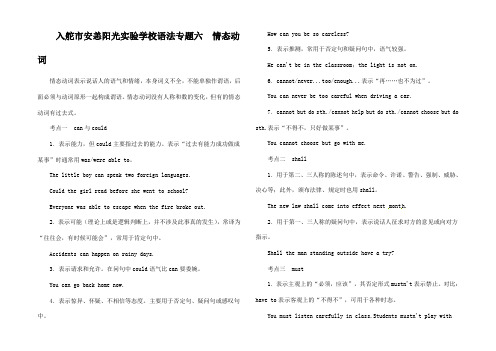
入舵市安恙阳光实验学校语法专题六情态动词情态动词表示说话人的语气和情绪,本身词义不全,不能单独作谓语,后面必须与动词原形一起构成谓语。
情态动词没有人称和数的变化,但有的情态动词有过去式。
考点一can与could1.表示能力,但could主要指过去的能力。
表示“过去有能力成功做成某事”时通常用was/were able to。
The little boy can speak two foreign languages.Could the girl read before she went to school?Everyone was able to escape when the fire broke out.2.表示可能(理论上或是逻辑判断上,并不涉及此事真的发生),常译为“往往会,有时候可能会”,常用于肯定句中。
Accidents can happen on rainy days.3.表示请求和允许。
在问句中could语气比can要委婉。
You can go back home now.4.表示惊异、怀疑、不相信等态度。
主要用于否定句、疑问句或感叹句中。
How can you be so careless?5.表示推测,常用于否定句和疑问句中,语气较强。
He can't be in the classroom;the light is not on.6.cannot/never...too/enough...表示“再……也不为过”。
You can never be too careful when driving a car.7.cannot but do sth./cannot help but do sth./cannot choose but do sth.表示“不得不,只好做某事”。
You cannot choose but go with me.考点二shall1.用于第二、三人称的陈述句中,表示命令、许诺、警告、强制、威胁、决心等;此外,颁布法律、规定时也用shall。
- 1、下载文档前请自行甄别文档内容的完整性,平台不提供额外的编辑、内容补充、找答案等附加服务。
- 2、"仅部分预览"的文档,不可在线预览部分如存在完整性等问题,可反馈申请退款(可完整预览的文档不适用该条件!)。
- 3、如文档侵犯您的权益,请联系客服反馈,我们会尽快为您处理(人工客服工作时间:9:00-18:30)。
系列一:句子成分Ⅰ学前诊断从A.B.C.D四个选项中,选出可以填入空白处的最佳选项.1. _____________were all very tired, but none of ________ would stop to take a rest.A. We; usB. Us; weC. Us; usD. We; we2. I never feel _______ while I am sitting in Richard’s car.A. safelyB. being safeC. safeD. safety3. I, who ________ your teacher, will try my best to help you with your studies.A. beingB. amC. areD. is4. ----What happened to Jack?----Oh dear, he fell off his bike and hurt __________.A. himB. hisC. heD. himself5. The old piano is ________ thing in my house.A. the valuable onlyB. the only valuableC. only the valuableD. valuable the only6. _________ at the examination results, the top student sat there in silence.A. DisappointedB. DisappointingC. To disappointD. Disappoint7. Walking along the river, we heard someone ________ for help.A. shoutB. shoutingC. shoutedD. having shouted8. _________ they said sounds reasonable.A. ThatB. WhichC. WhatD. How9. We will do _________ to reduce the costs.A. possibly everythingB.everything possiblyC. possible everythingD. everything possible10.My parents won’t _______ me play computer games even on Saturday evenings.A. letB. allowC. permitD. agree另外,还有插入语——插在句子中间或末尾的词This book, I think, is useful.呼语——对对方的称呼Sit down, children.感叹语——表示说话时的情绪Oh,so you’re back.Ⅲ实战演练1.分析下面句子成分:1).Who( )said( ) it( )?2).She( )dances( )beautifully( ).3).Where( )do they( )live( )?4).It( )was( )a nice day( ).5).The little( )girl( )is her( )daughter.6).Mother( ),where are you?7).This( ) is my teacher(),Mr Green( ).8).Don’t drive so( )fast( ).9).Hurrah( )!We have succeeded.( )10).This I guess( ), is yours.2. 从A.B.C.D四个选项中,选出可以填入空白处的最佳选项.1) They use computers to keep the traffic _______ smoothly.A. being runB. runC. to runD. running2) I’m amazed to hear from my school teacher again._______, it is ten years since we met last .A. In a wordB. What’s moreC. That’s to sayD. Believe it or not3) The trees ________ in the storm have been moved off the road.A. being blown downB. blown downC. blowing downD. to blow down4) To save class time, our teacher has ________students do half of the exercise in class andcomplete the other half for homework..A. usB. weC. ourD. ours5) _________ worries me the way he keeps changing his mind.A. ThisB. ThatC. WhatD. It6) _________ and happy, Tony stood up and accepted the prize.A. surprisingB. SurprisedC. Being surprisedD. To be surprising7) Don’t sit there ________ nothing. Come and help me with this tableA. doB. to doC. doingD. and doing8) The daily business, whether _________selling goods or shipping them, went quite smoothly.A. that isB. we wereC. it wasD. they are9) By the 1950’s, Mahalia Jackson’s powerful music style had gained her________.A. and she had an international reputationB. with an international reputationC. which was her international reputationD. an international reputation10)Anything for you, _________, was published while he was still at college and continues tobe a bestseller.A. is his first bookB. it is his first bookC. his first bookD. that is his first book3.翻译句子1) 找到一个好朋友不容易.______________________________________________________________________2) 我理想的工作是当一名记者.______________________________________________________________________3) 我们经常一起做作业,乐于彼此帮忙.______________________________________________________________________4) 我从未听到这个词用在英语口语当中.______________________________________________________________________5) 它含有一种强效的药物防治蚊虫叮咬.(affect mosquitoes)______________________________________________________________________6) 他考上了北大, 这一事实使许多人感到吃惊._____________________________________________________________________7) 他回到中国, 在北大学习新闻.系列二:句子的种类Ⅰ知识清单:句子按用途分为:陈述句疑问句祈使句感叹句把下列句子和类型进行搭配1.反意疑问句应注意的问题1)如果前一部分为否定形式,后一部分就用肯定形式,要特别注意:这时英语回答和汉语回答是不一致的。
----John doesn’t know anything about it, does he?---No, he doesn’t.2)如果陈述部分包含有“no, never, hardly, little, few, scarcely, seldom”,反意部分用肯定Y ou have never met each other before, have you?3)否定前缀/后缀:如果陈述部分的否定词仅带有否定前缀/后缀,那么,该陈述部分肯定句处理,反意疑问部分用否定形式。
She looked unhappy, didn’t she?4)主句的主语为this, that, everything, nothing时,反意疑问句的主语用it。
注意:陈述句的主语为nothing时,反意疑问句为肯定式。
Everything is all right, isn’t it?Nothing he did was right, was it?6)主句的主语为everyone, everybody, anyone, nobody, no one, someone时,附加疑问句的主语为he或they。
Everybody knows the answer, don’t they?/doesn’t he?7)主句是there be 句型时,附加疑问句用be there。
There were lots of people there, weren’t there?8)关于“have”表示“有”反意部分have/do He has a large house, hasn’t he/ doesn’t he?其他意思反意部分do The manager had her do the job, didn’t he?9)肯定祈使句will you 或won’t you否定的祈使句will youlet’s shall welet us will you/ won’t you10)陈述部分是主从复合句,疑问部分与主句保持一致。
